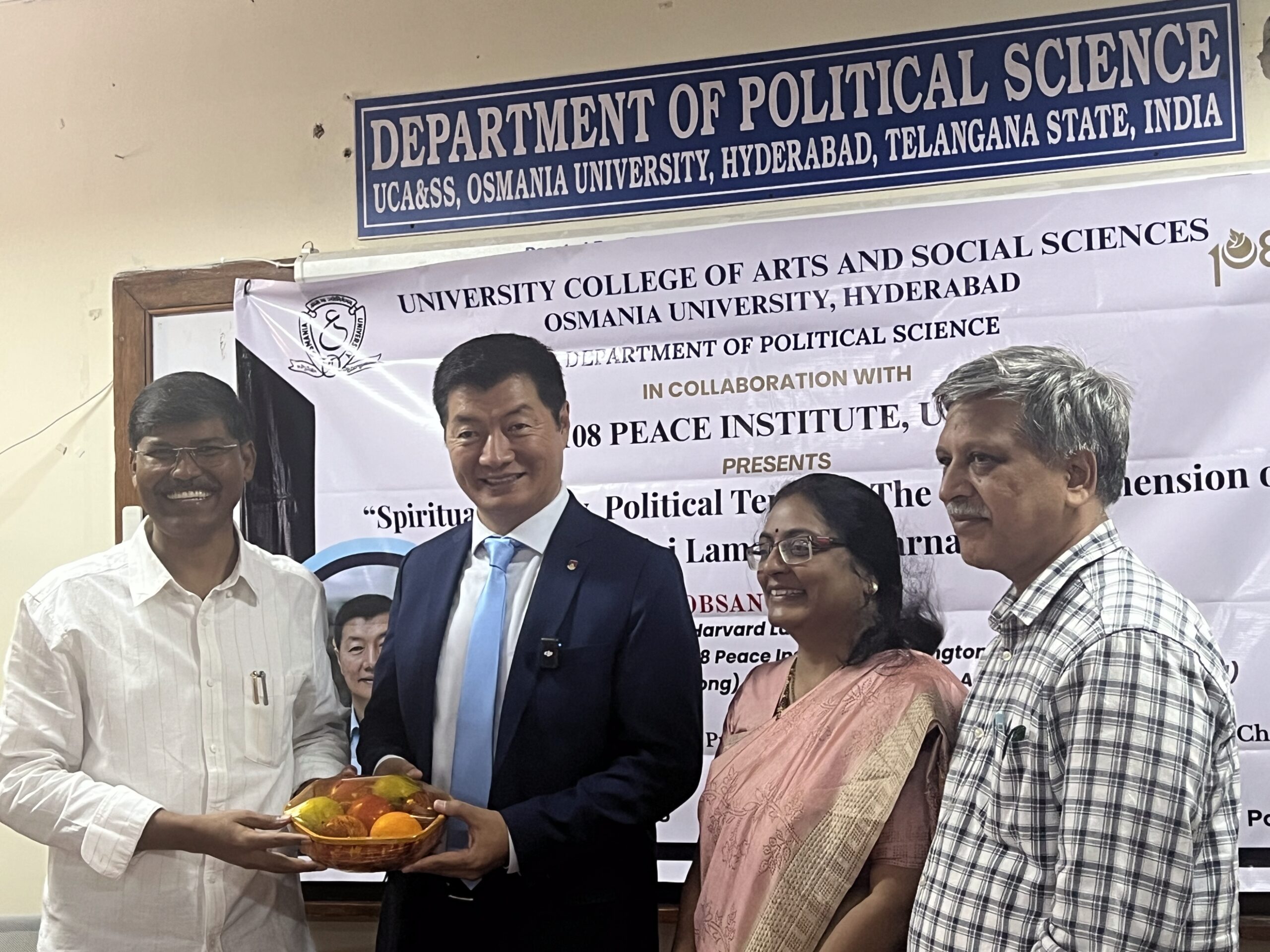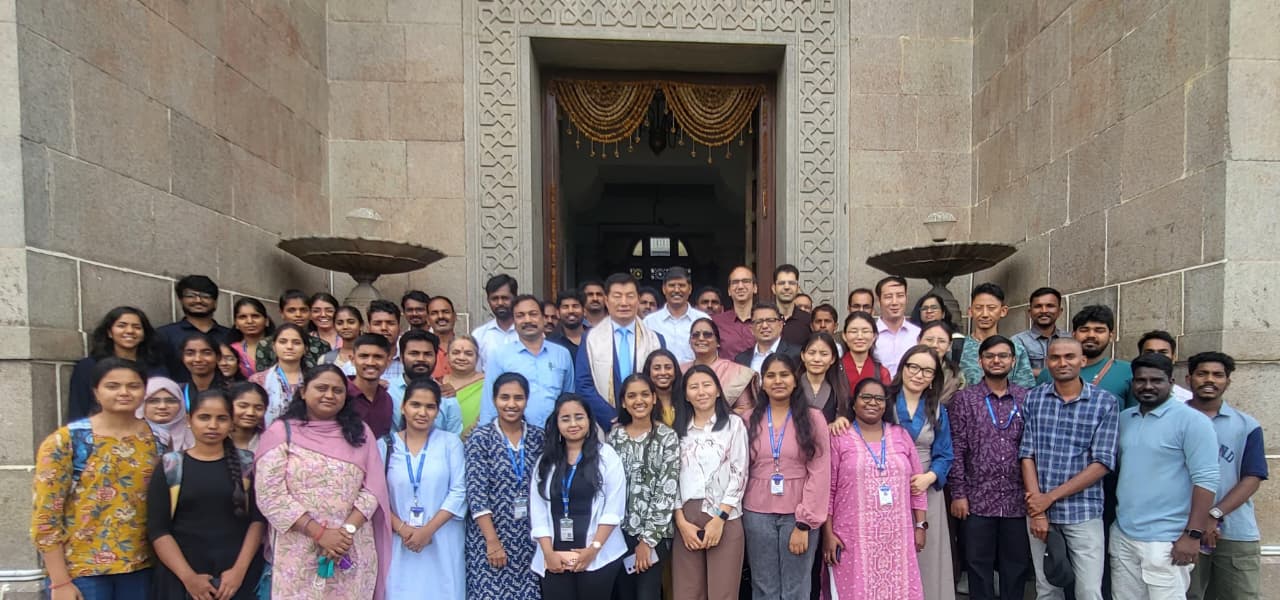September 16, 2025: In honor of the 90th birth anniversary of His Holiness the Great 14th Dalai Lama of Tibet (Goton), the 108 Peace Institute, in collaboration with the Department of Political Science, Osmania University, hosted a lecture session on “Spiritual Legacy, Political Tension: The Global Dimension of the Dalai Lama’s Reincarnation.” The Lecture session featured Dr. Lobsang Sangay, founding president of 108 Peace Institute.
Dr. Lobsang Sangay opened that session by exploring the spiritual and political dimensions of His Holiness the 14th Dalai Lama’s reincarnation. He began by emphasizing that His Holiness the Dalai Lama’s spiritual authority extends far beyond the borders of Tibet, reaching deep into the Buddhist regions of Mongolia and the Russian republics of Tuva, Buryatia, and Kalmykia. In addition, His Holiness is revered throughout the Himalayan belt, including Ladakh, Nepal, Bhutan, Sikkim, Arunachal Pradesh, and Himachal Pradesh. Widely acknowledged as the “Root Guru” in these regions, the Dalai Lama’s spiritual reach stretches from India to Russia, uniting diverse Buddhist communities through a shared philosophical heritage.
Dr. Sangay then delved into the life and legacy of His Holiness the Dalai Lama, beginning with his escape from Tibet in 1959 at the age of 23, following China’s illegal occupation. “He was familiar only with the sky and the land,” Dr. Sangay remarked, reflecting on the young spiritual leader’s unfamiliarity with politics or power. Despite this, His Holiness the Dalai Lama gradually rose to become one of the world’s most respected moral voices through years of learning, practice, and public engagement. Today, he has authored or co-authored more than 110 books and received over 150 prestigious global awards, including the Nobel Peace Prize, the Templeton Prize, the U.S. Congressional Gold Medal, and the UN Environment Award.
Addressing the issue of reincarnation of the 14th Dalai Lama, Dr. Sangay highlighted His Holiness’s recent public statement, made in July, confirming that he will reincarnate—after more than 14 years of appeals from Buddhist communities worldwide. His Holiness firmly declared that his next reincarnation would be born in a free country, a message echoed in the book Voice for the Voiceless. In a direct critique of the Chinese Communist Party (CCP) interference in the selection of his reincarnation, His Holiness said that if the CCP, which officially does not believe in religion, insists on selecting reincarnations, it should begin by finding the reincarnations of Mao Zedong, Zhou Enlai, and Deng Xiaoping.
Responding to audience questions, Dr. Sangay clarified the distinction between rebirth and reincarnation, highlighting the deep spiritual connection required between a guru and the followers. He noted that CCP neither has the legitimacy nor the understanding to recognize reincarnations. Reincarnation, he said, is an exclusive and personal spiritual decision of the Dalai Lama himself. His Holiness alone will determine where, when, and how he will be reborn. He further cited that CCP has been name calling His Holiness the Dalai Lama for the past 60 yrs such as “a monk in wolf clothing”, and noted the irony of being interested in recognizing the reincarnation.
Dr. Sangay further explained that after the passing of the Dalai Lama, a regency or search committee authorized by His Holiness the Dalai Lama—will be responsible for identifying his reincarnation. This committee, composed of individuals closely familiar with the Dalai Lama, will conduct familiarity and similarity tests among potential candidates. He emphasized that this process is spiritually rigorous. Citing a historical example, he noted that the 13th Dalai Lama was recognized by his own cook, a member of the search party—underscoring the authenticity and closeness required in the process.
Addressing the long-standing concern of the 11th Panchen Lama, Gedhun Choekyi Nyima, Dr. Sangay expressed serious concern. Abducted in 1995 at the age of six, along with his family, the Panchen Lama’s whereabouts remain unknown even after 30 years. The Chinese government has installed a state-appointed Panchen Lama, who, according to Dr. Sangay, is being groomed to manipulate the recognition of the next Dalai Lama. He warned that China’s strategy is aimed at political control. However, Dr. Sangay stressed the crucial difference between endorsement and recognition in Tibetan Buddhist tradition. While Dalai Lamas and Panchen Lamas have historically endorsed each other, the recognition of a reincarnation is a distinct and sacred process. The Dalai Lama is traditionally recognized by the Gaden Phodrang, while the Panchen Lama is recognized by the Tashi Lhunpo Monastery. In the past, no Panchen Lama has participated in the recognition of a Dalai Lama. Dr. Sangay denounced the Chinese attempt to rewrite this sacred tradition as manipulative and warned of its long-term implications not just for Tibet but the entire world.
The session saw the participation of around 80 students and faculty members. It concluded with an engaging and thought-provoking question-and-answer session. The lively exchange addressed several pressing concerns, ranging from Tibet’s geopolitical significance to the intricate spiritual traditions surrounding the Dalai Lama’s reincarnation. Through these discussions, participants gained deeper insights into the historical, political, and cultural dimensions of the Tibetan issue.


